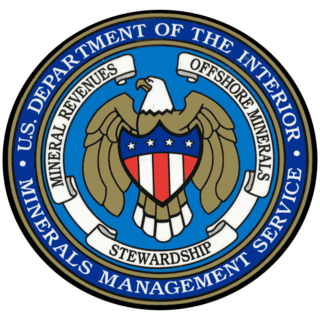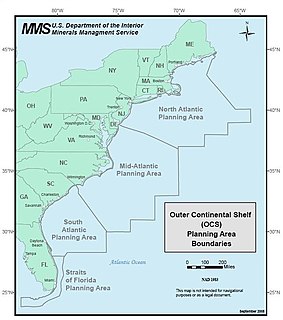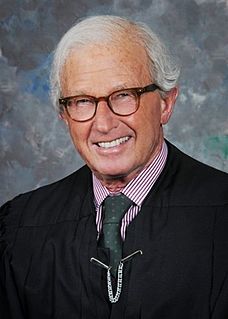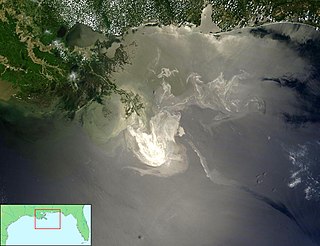
The Exxon Valdez oil spill occurred in Prince William Sound, Alaska, on March 24, 1989. Exxon Valdez, an oil supertanker owned by Exxon Shipping Company bound for Long Beach, California struck Prince William Sound's Bligh Reef, 1.5 mi (2.4 km) west of Tatitlek, Alaska at 12:04 a.m. and spilled 10.8 million US gallons (257,000 bbl) of crude oil over the next few days.

The Minerals Management Service (MMS) was an agency of the United States Department of the Interior that managed the nation's natural gas, oil and other mineral resources on the outer continental shelf (OCS).

Jerry Edwin Smith is an American attorney and jurist serving as a United States Circuit Judge of the United States Court of Appeals for the Fifth Circuit.

Deepwater Horizon was an ultra-deepwater, dynamically positioned, semi-submersible offshore drilling rig owned by Transocean and operated by BP. On 20 April 2010, while drilling at the Macondo Prospect, a blowout caused an explosion on the rig that killed 11 crewmen and ignited a fireball visible from 40 miles (64 km) away. The fire was inextinguishable and, two days later, on 22 April, the Horizon sank, leaving the well gushing at the seabed and causing the largest marine oil spill in history.

Offshore drilling for oil and gas on the Atlantic coast of the United States took place from 1947 to the early 1980s. Oil companies drilled five wells in Atlantic Florida state waters and 51 exploratory wells on federal leases on the outer continental shelf of the Atlantic coast. None of the wells were completed as producing wells. All the leases have now reverted to the government.
William Eugene Davis, known as W. Eugene Davis, is a Senior United States Circuit Judge of the United States Court of Appeals for the Fifth Circuit. His chambers are in New Orleans, Louisiana.

Martin Leach-Cross Feldman was a United States district judge of the United States District Court for the Eastern District of Louisiana.
Offshore oil and gas in the Gulf of Mexico is a major source of oil and natural gas in the United States. The western and central Gulf of Mexico, which includes offshore Texas, Louisiana, Mississippi, and Alabama, is one of the major petroleum-producing areas of the United States. Oil production from US federal waters in the Gulf of Mexico reached an all-time annual high of 1.65 million barrels per day in 2017. Oil production is expected to continue the upward trend in 2018 and 2019, based on ten new oil fields which are planned to start production in those years. According to the Energy Information Administration, "Gulf of Mexico federal offshore oil production accounts for 15% of total U.S. crude oil production and federal offshore natural gas production in the Gulf accounts for 5% of total U.S. dry production."

The Deepwater Horizon oil spill was an industrial disaster that began on 20 April 2010 off of the coast of the United States in the Gulf of Mexico on the BP-operated Macondo Prospect, considered to be the largest marine oil spill in the history of the petroleum industry and estimated to be 8 to 31 percent larger in volume than the previous largest, the Ixtoc I oil spill, also in the Gulf of Mexico. The United States federal government estimated the total discharge at 4,900 Mbbl. After several failed efforts to contain the flow, the well was declared sealed on 19 September 2010. Reports in early 2012 indicated that the well site was still leaking. The Deepwater Horizon oil spill is regarded as one of the largest environmental disasters in world history.

Scott Anthony Angelle is an American politician who is the former director of the Bureau of Safety and Environmental Enforcement in Washington, D.C. From 2013 to 2017, he was the District 2 member of the Louisiana Public Service Commission, an elected five-person utility regulatory body.
The following is a timeline of the Deepwater Horizon oil spill. It was a massive oil spill in the Gulf of Mexico, the largest offshore spill in U.S. history. It was a result of the well blowout that began with the Deepwater Horizon drilling rig explosion on April 20, 2010.
The civil and criminal proceedings stemming from the explosion of Deepwater Horizon and the resulting massive oil spill in the Gulf of Mexico began shortly after the April 20, 2010 incident and have continued since then. They have included an extensive claims settlement process for a guilty plea to criminal charges by BP, and an ongoing Clean Water Act lawsuit brought by the U.S. Department of Justice and other parties.
This article covers the effect of the Deepwater Horizon disaster and the resulting oil spill on global and national economies and the energy industry.
On May 30, 2010 a 6-month moratorium on all deepwater offshore drilling on the Outer Continental Shelf was declared by U.S. Secretary of the Interior Ken Salazar. The limitation was in response to the Deepwater Horizon oil spill which occurred in the Gulf of Mexico.
Following is a timeline of the Deepwater Horizon oil spill for June 2010.
Following is a Timeline of the Deepwater Horizon oil spill for May 2010.
Reactions to the Deepwater Horizon oil spill from various officials and interested parties ranged from blame and outrage at the damage caused by the spill, to calls for greater accountability on the part of the U.S. government and BP, including new legislation dealing with preventative security and clean-up improvements.
Shallow water drilling is the process of oil and gas exploration and production in less than 150 meters of water.
The Back to Work Coalition is a group of twelve offshore oil and gas industry stakeholders and trade associations, that have banded together to oppose the federal and regulatory policies placed on the industry following the Deepwater Horizon oil well explosion of April 2010. After the explosion, the Obama administration imposed a federal moratorium on deepwater drilling that lasted through mid-October 2010. The Back to Work Coalition was created in December 2010 to combat what the members believe is a "de facto" moratorium, caused by the federal government's hesitance in issuing drilling permits on the gulf's Outer Continental Shelf (OCS). The coalition was founded by Louisiana Department of Natural Resources (DNR) Secretary Scott Angelle. The coalition is facilitated by the Gulf Economic Survival Team (GEST), a non-profit organization created to restore Louisiana's economy following the moratorium.

Executive Order 13990, officially titled Protecting Public Health and the Environment and Restoring Science to Tackle the Climate Crisis is an executive order signed by President Joe Biden on January 20, 2021 which implements various environmental policies of his administration including revoking the permit for the Keystone XL Pipeline and temporarily prohibiting drilling in the arctic refuge.









